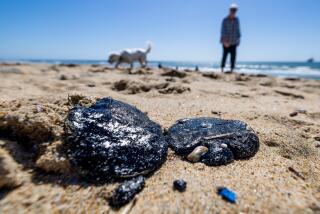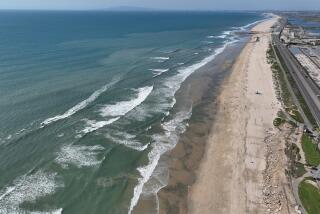Crews Work to Clean Wetlands Fouled by Oil
- Share via
About 200 workers scrambled Sunday to clean up more than 10,000 gallons of crude oil that spilled across a one-mile stretch of beach and fragile marshlands in McGrath State Park near Oxnard on Christmas Day.
The oil spill, which occurred when a transfer pipe operated by Bush Oil Co. ruptured, is among the largest in recent Ventura County history.
By Sunday afternoon, animal rescue workers had recovered more than a dozen birds that were injured or killed by the slick that tarred the highly sensitive wetlands.
Officials at Bush Oil said Sunday that they did not know what caused the eight-inch-wide pipe to break. A spokesman for the company said the pipe, which carries oil between two storage tanks, had been tested for stress within the past year.
The incident was under investigation Sunday by officials from the state Department of Fish and Game’s Office of Oil Spill Prevention and Response. Lt. Mark Caywood of that office speculated that either corrosion or stress from vibrations of nearby Harbor Boulevard may have weakened the pipe.
Bush officials said the pipe had no mechanism to alert workers if the oil pressure changed dramatically.
Oil had been spilling for at least three hours before crews responding to reports of oil in the ocean were able to trace it to the Bush plant.
Oil from the ruptured pipe had spilled into a canal that channels runoff from Oxnard’s agricultural fields into tiny McGrath Lake. Some of the oil-contaminated lake water then spilled through a separate canal into the ocean.
Environmental cleanup workers from four local companies worked through the night Saturday to try to contain the damage. Bulldozers and crews with shovels pushed oil-stained sand off the beaches, skiffs pulled booms across McGrath Lake and 13 boats worked half a mile offshore to contain the widening oil slick.
“You can’t put the genie back in the bottle, so the best we can do now is work to get this cleaned up as quickly as possible,” said John Grant, a biologist dispatched to the scene by the state Department of Fish and Game.
By midday Sunday, signs of the environmental damage caused by the spill were surfacing as workers found a dead muskrat, seven dead birds and several additional oil-drenched birds that were barely able to move.
Six animal rehabilitation experts from Los Angeles and Santa Barbara donned protective white suits and thick rubber gloves, and scoured the edges of the lake in search of injured or dead waterfowl.
At one point, Mimi Wood, an employee of the Berkeley-based International Bird Rescue and Research Center, raced from the wetlands cradling an oil-covered mud hen.
“Can you believe he’s still alive?” she asked Fish and Game biologist Melissa Boggs as the two tried to swab the oil from the hen’s eyes and beak. “He’s got a chance to survive.”
Fish and Game officials said the area is home to a variety of waterfowl and plant life.
“Unfortunately, we can expect to see them turning up dead in larger numbers over the next three or four days,” Grant said.
Deputy Dist. Atty. Gregory Brose said Bush could face legal action if the company is found to be negligent.
“If there had been an indication that the pipeline was weak, or if there is evidence that they were negligent, there is the potential for felony prosecution,” he said.
In addition, he said the state frequently reviews such cases in an effort to recover money for the harm caused to its natural resources.
Earlier this year, Mobil Oil Co. pleaded no contest to a criminal charge that sprang from a 1991 oil spill.
In that incident--the worst to impact Ventura County in recent years--a pipeline ruptured, causing nearly 75,000 gallons to enter the Santa Clara River in Valencia and eventually kill 186 birds in Los Angeles and Ventura counties.
Officials from Bush Oil, a subsidiary of Berry Petroleum Co. in Taft, said they could not predict how long the cleanup would last.
“We’re going to continue with this as long as it takes,” said Ron Klarc, operations manager for Bush Oil. “The complete operation won’t be done for some time.”
Cleanup of the lake was primarily being accomplished with four small skiffs that used booms to encircle the oil, channeling it into skimmers that suck the oil from the water’s surface.
Normally, the lake is used to collect runoff from area farms, but Fish and Game officials said they planned to construct a dam and bypass line to temporarily prevent more water from running there.
“It’s crucial that we keep the lake level,” Caywood said. “If it rises, it will paint the plant life with oil and, if it goes down, it will smother the life beneath the oil.”
A brief rainfall Sunday was not enough to make a difference, Caywood said.
“We’ve got to keep our fingers crossed that we don’t get a storm in here now,” he said. “That can only cause trouble.”
On the beach, about 100 workers hurriedly scooped oil-drenched sand into plastic bins so that rain would not send it back into the ocean.
By late Sunday, three vessels from Clean Seas, a cleanup consultant hired by Berry, and seven more from the volunteer Fisherman’s Oil Response Team had contained all but about 10 barrels of oil offshore.
Fish and Game officials said they did not consider the slick a serious threat to ocean life.
Grant looked for any evidence of harm to sand-dwelling creatures and found none. And Caywood said that although whales migrate near the coast at this time of year, they probably would not pass close enough to the slick to be harmed.
“Whales seem to know how to avoid it,” Caywood said. “It’s a pretty safe bet that they will bypass this.”
Officials were also eyeing Ventura beaches to ensure that no danger would come to area beach-goers.
“We haven’t found any oil on the beaches to the north, but this stuff is still moving around, so we want to follow it closely,” said Kirk Sturm, an officer with the California Parks Service.
The area of greatest concern Sunday afternoon was ensuring that the oil slick would not drift into Ventura Harbor, Clean Seas manager Darryle Waldron said. “We’ll be able to boom that off if it becomes a threat.”
Meteorologists reported fairly calm seas, which Waldron said may help crews contain the ocean spill by nightfall today.
Oxnard Mayor Manuel Lopez called the spill “very, very unfortunate.”
“Even after they clean up the visible parts, the impacts will be very long-lasting,” he said. “All that can be done is to clean it up and try to prevent events such as this from happening again.”
Assemblyman Jack O’Connell (D-Carpinteria), who in early January will introduce legislation to restrict new oil and gas drilling leases in offshore waters, said the Christmas Day incident was a shocking illustration of what can happen when oil is spilled on water.
“It’s a very unfortunate situation,” O’Connell said. “It serves as a painful reminder to all of us of the extreme caution that needs to be exercised on a daily basis when it comes to the transportation of oil.”
Once the cleanup crews have pulled out, Berry spokesman Raymond L. Hatch said the company will have a chance to tally the costs of the effort.
Hatch said he could not predict how much that would be, but it will include not only the cleanup, but the loss of revenue from the Oxnard oil field, which generates 1,200 barrels of oil a day.
“There’s no question about it,” Hatch said. “It’s going to cost us.”
Correspondents Jeff McDonald and J. E. Mitchell contributed to this report.
* WILDLIFE RESCUE: The toll on wildlife mounts as cleanup efforts continue. B1
More to Read
Sign up for Essential California
The most important California stories and recommendations in your inbox every morning.
You may occasionally receive promotional content from the Los Angeles Times.













